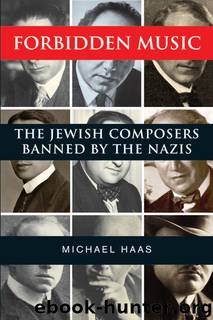Forbidden Music by Michael Haas

Author:Michael Haas
Language: eng
Format: epub
ISBN: 9780300154306
Publisher: Yale University Press
Weißmann also takes a look at the composers who are influenced by d'Albert and Italian verismo. This is an area where he finds much to praise for literary choice and some fine music. Yet, ultimately, he concludes that some element is missing that condemns them to what he calls ‘a mere paper existence’. ‘Apart from d'Albert and the Italian masters, we find composers marching down similar paths such as [Hermann Wolfgang] von Waltershausen, who wrote his own libretto for his opera Colonel Chabert in a free adaptation from Balzac. This highly theatrical text lost something in its musical adaptation, though its strongest points were those that focused on the stage. This is quite different from [the Jewish composer] Ignaz Waghalter whose setting of Paul Eger's libretto of Machiavelli's Mandragola grips while filling what is essentially a not very musical subject with such quantities of musical ideas that both the saucy tale and the delightful music charge forward together.‘17 Weißmann then goes on to deal with the Dutch composer Jan Brandts-Buys, whose opera The Tailors of Schönau had enjoyed considerable success, the Viennese composer Julius Bittner whose opera Das höllisch Gold was more successful still, and even comments that Leoš Janáček has, with his opera Jenůfa, composed a work that follows in the ‘general racial style’ of his Bohemian predecessors, Smetana and Dvořák. He singles out the German Italian composer Ermanno Wolf-Ferrari as a ‘post-Wagnerian classicist’ who changes from one work to the next. Another German composer to engage with Italian verismo is Paul Graener, whose opera Don Juan's Last Adventure and Theophano are praised in passing, while Walter Braunfels's The Birds ‘hovers somewhere between Wagner's Meistersinger and Richard Strauss’ Ariadne auf Naxos’.18 Weißmann continues:
And again we bump into both [Franz] Schreker and [Erich Wolfgang] Korngold. It's no coincidence that these two Viennese are more successful with their operas than any of their contemporaries. Neither is problematic. Schreker attempts to make the erotic profound, he writes his own texts that take us from the flighty historic romanticism of [the Viennese artist] Hans Makart to the most profound. But his Spielwerk und die Prinzessin, Die Gezeichneten and Der Schatzgräber are not the fulfilment of the promise shown by his opera Der ferne Klang. They are the result of compromised efforts, highly polished naivety and full of effects while lacking individuality. Yet as a type of hybrid musical theatre, they have their unique place.
Erich Wolfgang Korngold, on the other hand – composer of Violanta, Der Ring des Polykrates and Die tote Stadt – is the only true contemporary opera composer who has been able to balance the many different factors demanded by musical theatre. He is the only one who allows the voice to soar above the superb instrumentation of his orchestral writing, and he's the only one after Puccini who has the courage and the ability to overcome all of opera's many inherent problems. Of course, it must be understood that this is only possible by sacrificing his individuality.19
Download
This site does not store any files on its server. We only index and link to content provided by other sites. Please contact the content providers to delete copyright contents if any and email us, we'll remove relevant links or contents immediately.
Fanny Burney by Claire Harman(26588)
Empire of the Sikhs by Patwant Singh(23064)
Out of India by Michael Foss(16838)
Leonardo da Vinci by Walter Isaacson(13299)
Small Great Things by Jodi Picoult(7107)
The Six Wives Of Henry VIII (WOMEN IN HISTORY) by Fraser Antonia(5492)
The Wind in My Hair by Masih Alinejad(5082)
A Higher Loyalty: Truth, Lies, and Leadership by James Comey(4942)
The Crown by Robert Lacey(4794)
The Lonely City by Olivia Laing(4792)
Millionaire: The Philanderer, Gambler, and Duelist Who Invented Modern Finance by Janet Gleeson(4454)
The Iron Duke by The Iron Duke(4341)
Papillon (English) by Henri Charrière(4247)
Sticky Fingers by Joe Hagan(4179)
Joan of Arc by Mary Gordon(4085)
Alive: The Story of the Andes Survivors by Piers Paul Read(4013)
Stalin by Stephen Kotkin(3949)
Aleister Crowley: The Biography by Tobias Churton(3625)
Ants Among Elephants by Sujatha Gidla(3452)
